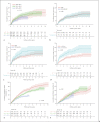Period-Dependent Survival Benefit of Percutaneous Microwave Ablation for Hepatocellular Carcinoma: A 12-Year Real-World, Multicentric Experience
- PMID: 35978603
- PMCID: PMC9294937
- DOI: 10.1159/000522134
Period-Dependent Survival Benefit of Percutaneous Microwave Ablation for Hepatocellular Carcinoma: A 12-Year Real-World, Multicentric Experience
Abstract
Introduction: Although microwave ablation (MWA) is a promising technique for hepatocellular carcinoma (HCC) treatment, its 10-year efficacy is unknown.
Objective: The objective of the study was to assess whether the advances in MWA for HCC translated into a real-world survival benefit.
Methods: This retrospective study included 2,354 patients with Barcelona Clinic Liver Cancer (BCLC) stage 0 to B from 5 hospitals, with at least 2 years of follow-up for all the patients. Recurrence and survival were analyzed using the Kaplan-Meier method with time-period stratification.
Results: A total of 5,326 HCCs (mean diameter, 2.9 cm ± 1.2) underwent 4,051 sessions of MWA with a median follow-up of 61.3 (0.6-169.5 range) months during 3 periods (2007-2010, 2011-2014, and 2015-2018). Technical success was achieved in 5,194 (97.5%) tumors with significant improvement over time, especially for >3.0-cm HCC (p < 0.001). Local tumor progression (LTP) showed no period-dependent advance, with >3.0-cm HCC and perivascular location being the risk factors for LTP. The median intrahepatic metastasis time was 27.6 (95% confidence interval [CI]: 25.2-28.8) months, with 5- and 10-year occurrence rates of 68.8% and 79.4%, respectively. The 5- and 10-year overall survivals were 63.9% and 41.1%, respectively, and BCLC stage 0, A, and all B patients showed an observable survival improvement over time (p < 0.001). The median disease-free survival time increased from 19.4 (95% CI: 16.5-22.6) months in 2007-2010 to 28.1 (95% CI: 25.9-32.3) months in 2015-2018. The improved survival for early recurrent (≤2 years) patients was period-dependent, as verified by Cox regression analyses. The major complications rate per procedure was 3.0% (122/4,051).
Conclusions: These real-world data show that MWA provided an upward trend in survival for HCC patients with BCLC stage 0-B over a 12-year follow-up period. An encouraging clear survival benefit in early recurrent patients was also observed.
Keywords: Hepatocellular carcinoma; Microwave ablation; Period-dependent survival benefit; Real-world data.
Copyright © 2022 by The Author(s). Published by S. Karger AG, Basel.
Figures




References
-
- Siegel RL, Miller KD, Jemal A. Cancer statistics, 2019. CA Cancer J Clin. 2019 Jan;69((1)):7–34. - PubMed
-
- Lencioni R. Loco-regional treatment of hepatocellular carcinoma in the era of molecular targeted therapies. Oncology. 2010 Aug;78 Suppl 1:107–12. - PubMed
-
- Seki T, Wakabayashi M, Nakagawa T, Itho T, Shiro T, Kunieda K, et al. Ultrasonically guided percutaneous microwave coagulation therapy for small hepatocellular carcinoma. Cancer. 1994 Aug 1;74((3)):817–25. - PubMed
-
- Simon CJ, Dupuy DE, Mayo-Smith WW. Microwave ablation: principles and applications. Radiographics. 2005 Oct;25 Suppl 1:S69–83. - PubMed
LinkOut - more resources
Full Text Sources

